“Eventually everything connects - people, ideas, objects. The quality of the connections is the key to quality per se.” - Charles Eames
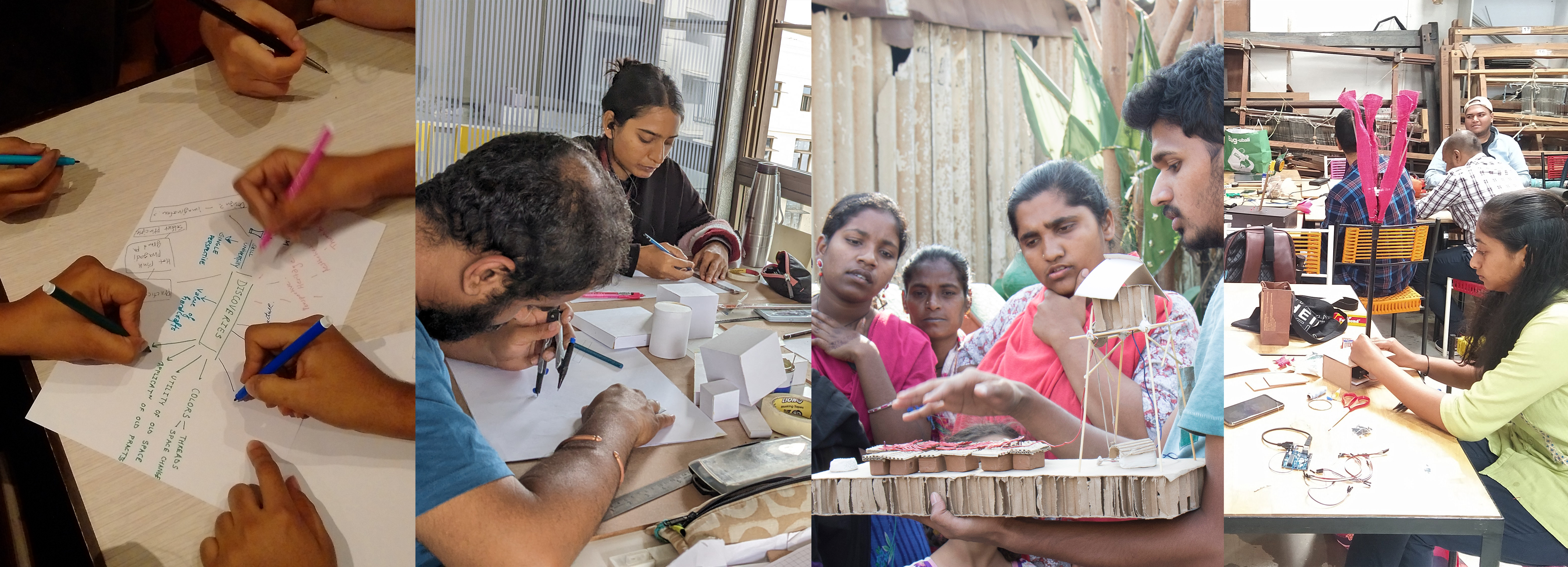 Design Process
Design Process
Vision
Our vision is to cultivate a community of dynamic, socially conscious designers who are equipped with the skills, knowledge, and mindset necessary to address the complex challenges we face today, through thoughtful research, sustainable methodologies, and a commitment to positive change.
Our program envisions a future where industrial arts and design seamlessly blend with research, fostering a deep understanding of complex ecosystems. By emphasizing a holistic approach, we aim to empower our learners to become adept problem solvers, capable of navigating the intricacies of contemporary issues with creativity and resilience.
We seek to foster an environment that encourages curiosity, critical inquiry, and the courage to challenge conventions to become critical and independent thinkers. The program aims to produce graduates who are not just skilled practitioners but visionary leaders, capable of driving positive change in the design landscape.
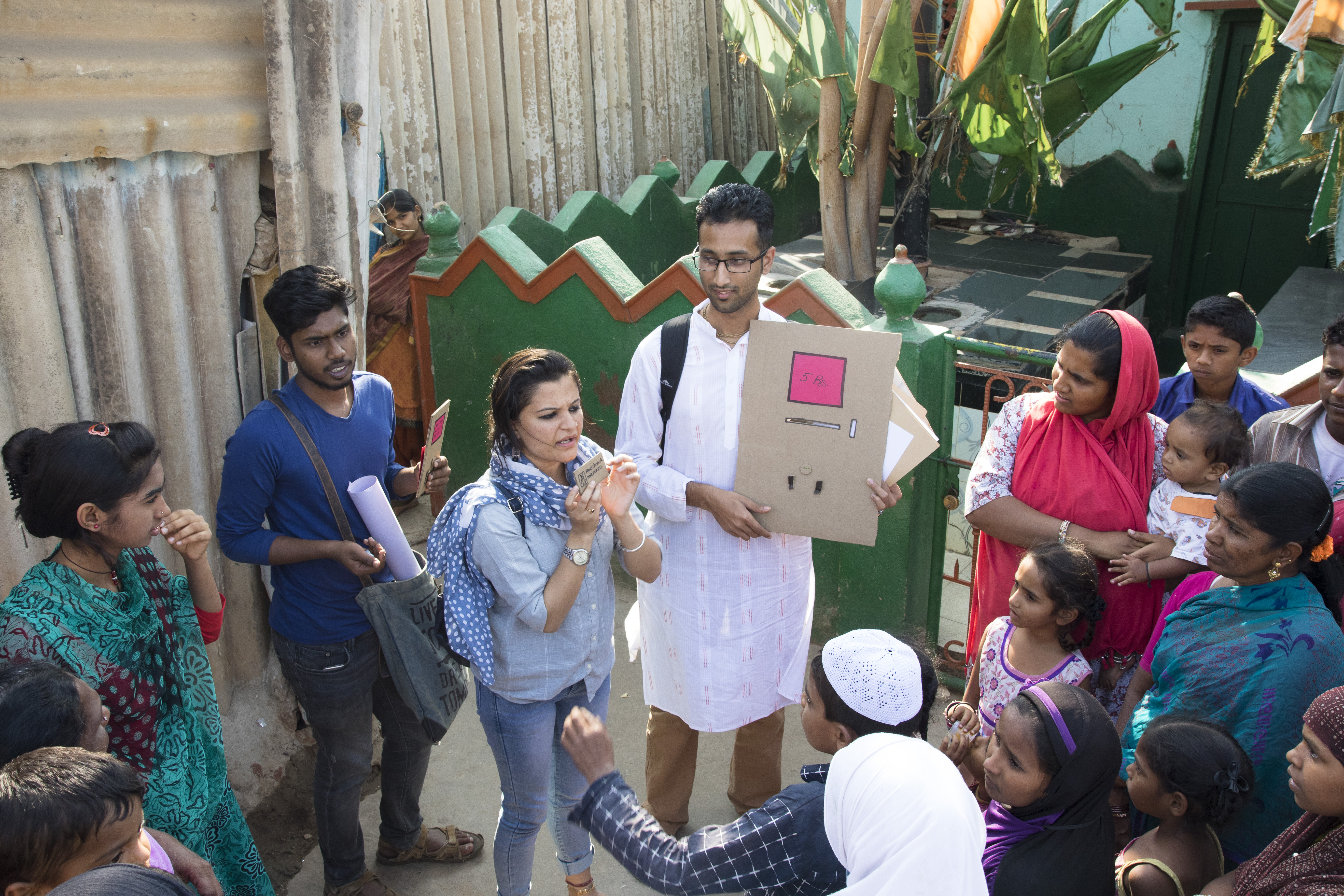 Community Engagement – Students testing their design ideas
Community Engagement – Students testing their design ideas
What kind of value does design bring to products and systems? If design is about improving the quality of life for people, it is also destroying the environment by inundating the world with short-lifecycle products and growing landfills. How can we develop as conscious, creative practitioners, sensitive to the impact of our work on the planet?
Design plays a crucial role in shaping a better future on multiple fronts. Whether it's urban planning, technology, or everyday products, intentional and thoughtful design can contribute to positive outcomes.
In the tapestry of human progress, design and creative thinking stand as crucial threads, weaving innovation and progress into the fabric of society. The fusion of these elements has the power to shape the world we live in, addressing challenges, enhancing experiences, and fostering a collective sense of well-being.
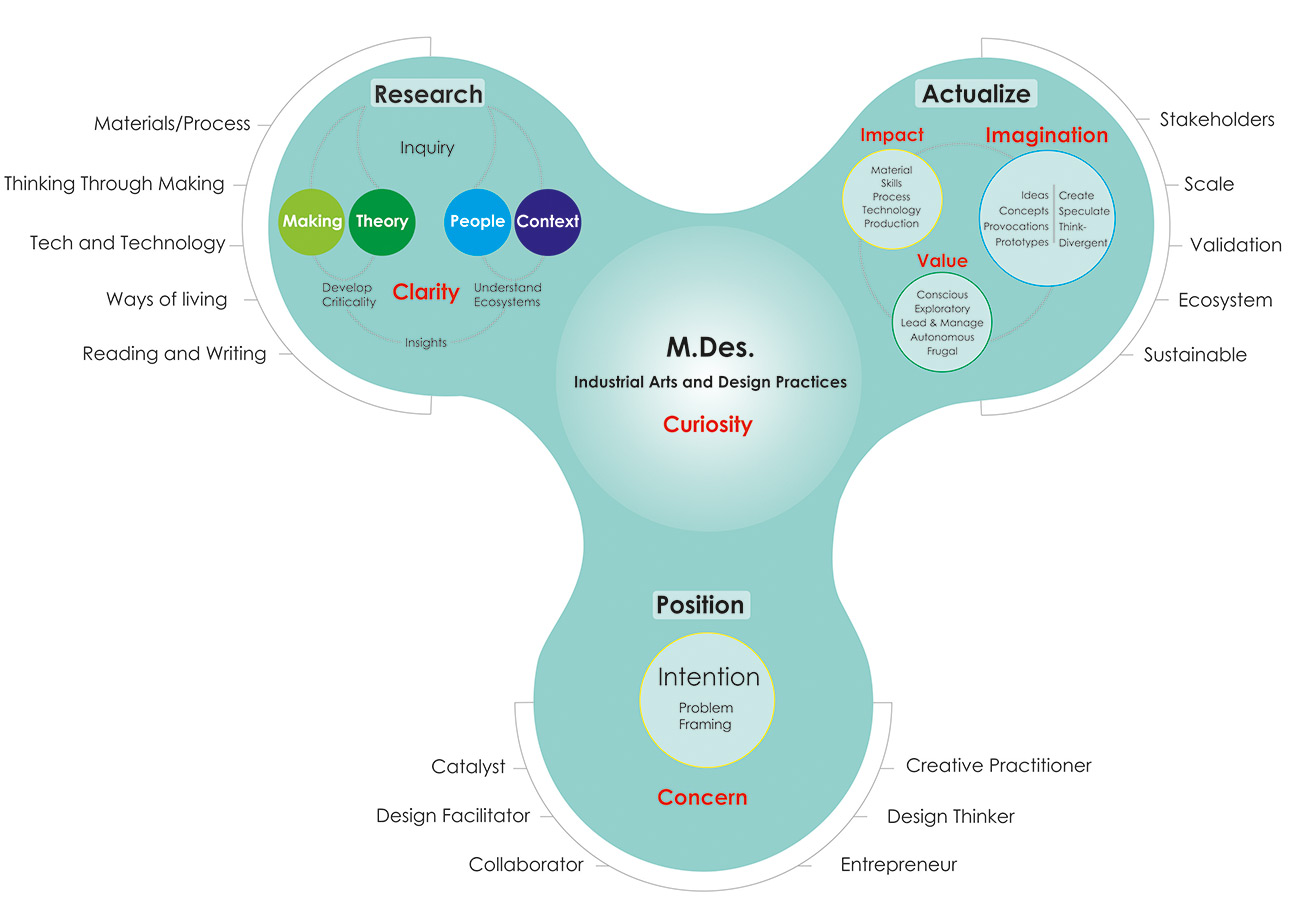 Learners can navigate and tailor their creative journey through pathways of –
Learners can navigate and tailor their creative journey through pathways of –
Product & Furniture Design and Natural Fibres & Textiles
Master of Design program in Industrial Arts and Design Practices is a comprehensive two-year journey that aims to nurture visionary designers who can drive creative impact, innovate and make things to foster a sustainable future, celebrate the rich heritage of the Indian craft industry, and lead innovation through in-depth research and hands-on making.
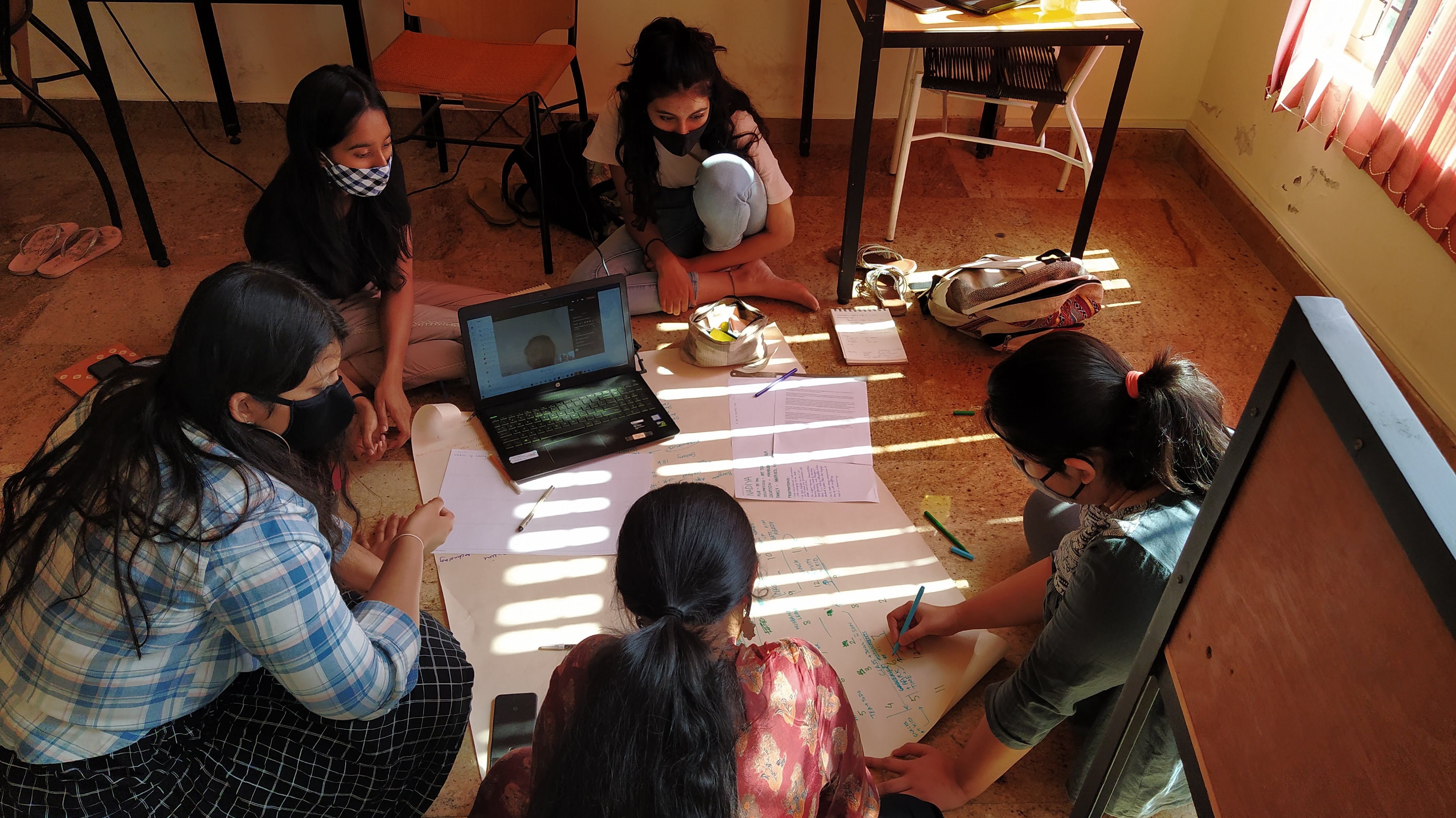 Brainstorming session – classroom studio
Brainstorming session – classroom studio
Based on the framework of inquiry and research, this course is designed to help you articulate your practice and situate yourself in the larger world of art and design. This is not a condensed version of the under-graduate program, but will build on your knowledge and experiences, equipping you with creative thinking and making skills using tools like mapping, systems understanding, making informed choices about materials and processes and translating the abstract into tangible form etc. The overall learning experience helps you leverage past education to move to a position where you are able to lead, drive and manage, rather than start afresh in any new field. It combines best practices from art and design methodologies, which then allows you a complex navigation between exploring, conceptualizing and translation.
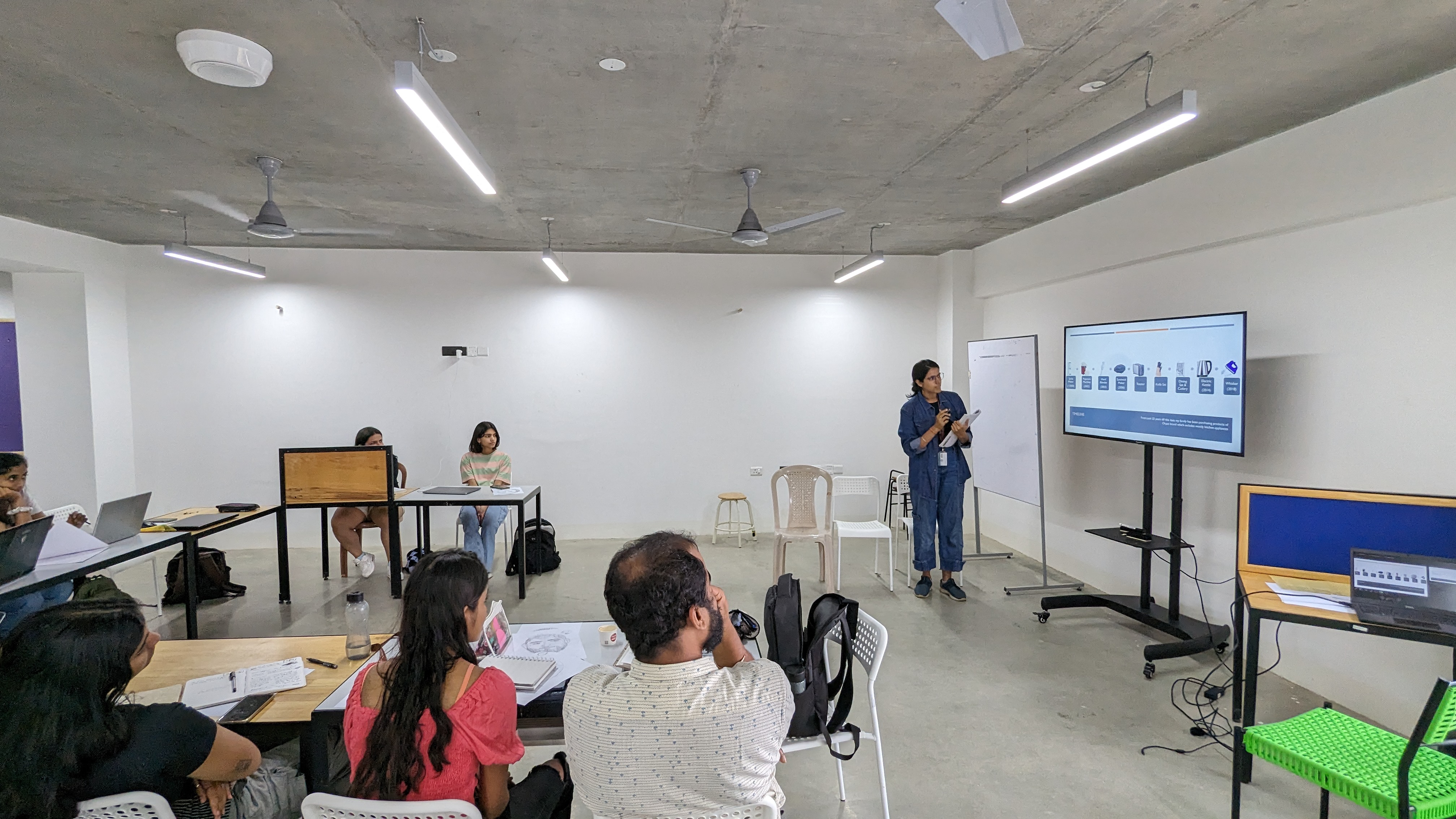 Student Presentation – Classroom studio
Student Presentation – Classroom studio
The artistic practice allows you to develop sensibilities exploring multiple materials, techniques and technologies, craft and mass manufacturing industries leading to a rigorous search for form and content. The program opens up possibilities to establish a dialogue between multiple media, materiality and conceptual rigor.
If you see yourself as a creative textile designer or artist, if you are keenly interested in the way products are envisaged, used and valued, if you would like to influence the way people use furniture in the future, we help you construct frameworks to realize your potential and vision.
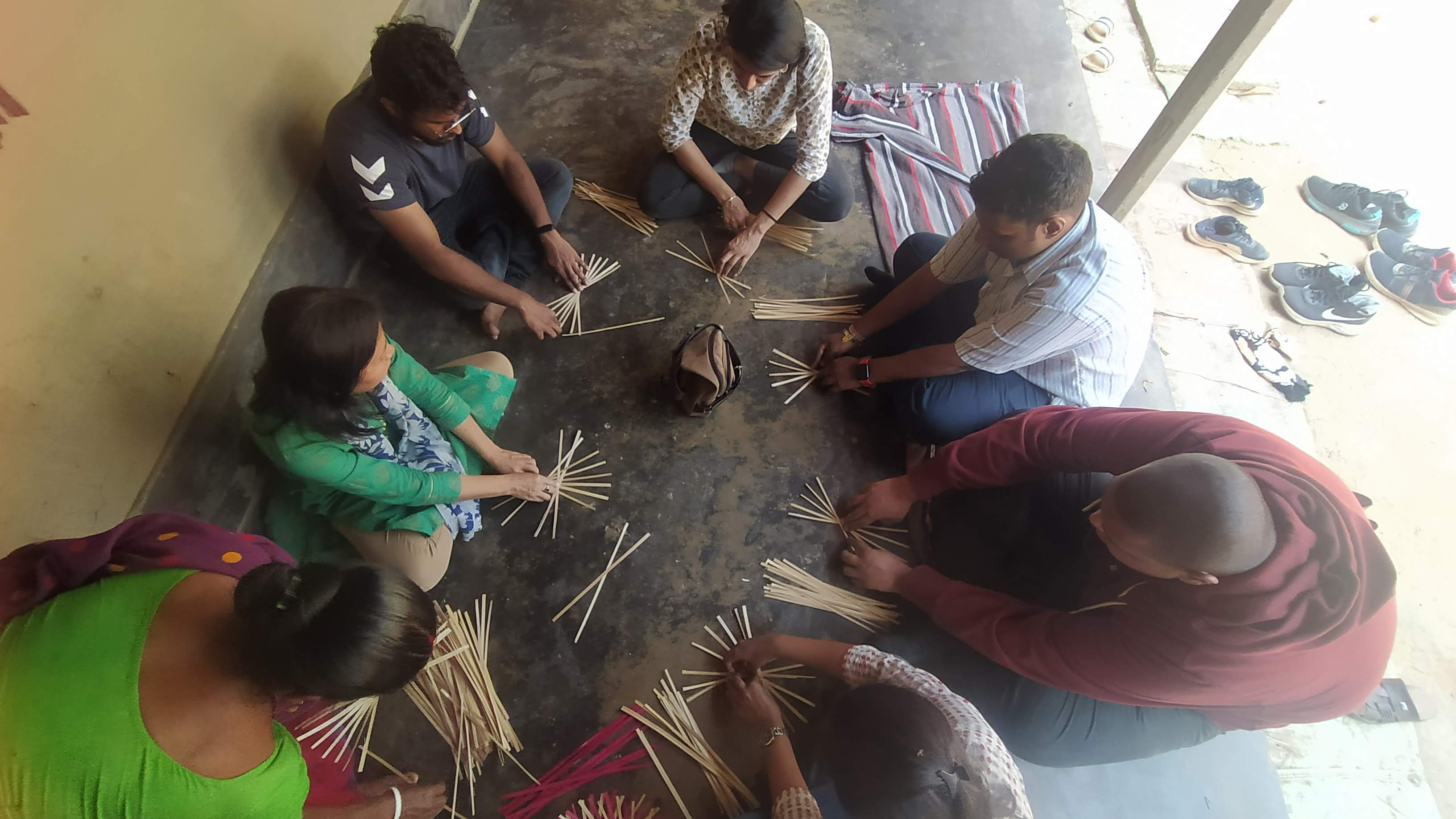 Collaborative Field based Design studio- students working with bamboo artisan
Collaborative Field based Design studio- students working with bamboo artisan
Core Values:
- Creative Impact: We believe in the power of design to make a positive impact on society, culture, and individuals. Our program emphasizes pushing the boundaries of creativity to create designs that evoke emotions, challenge norms, and inspire change.
- Sustainable Future: Sustainability is at the heart of our program. We instil a deep understanding of ecological and social impacts, encouraging students to develop solutions that minimize environmental harm, promote responsible consumption, and contribute to a more sustainable future.
- Indian Craft Industry: Recognizing the rich cultural heritage of India's craft industry, our program seeks to revive, reinterpret, and contemporize traditional craftsmanship. We celebrate the unique stories woven into each craft and encourage students to collaborate with artisans, bridging the gap between heritage and modernity.
- Innovation and Research: We foster a culture of innovation through rigorous research methodologies. Students are encouraged to explore uncharted territories, challenge assumptions, and develop novel solutions that address pressing challenges faced by industries and society.
- Hands-on Making: Our program recognizes the importance of tactile learning. Students are provided with state-of-the-art facilities to bring their concepts to life. By engaging in hands-on making, they develop a holistic understanding of materials, processes, and the nuances of design realization.
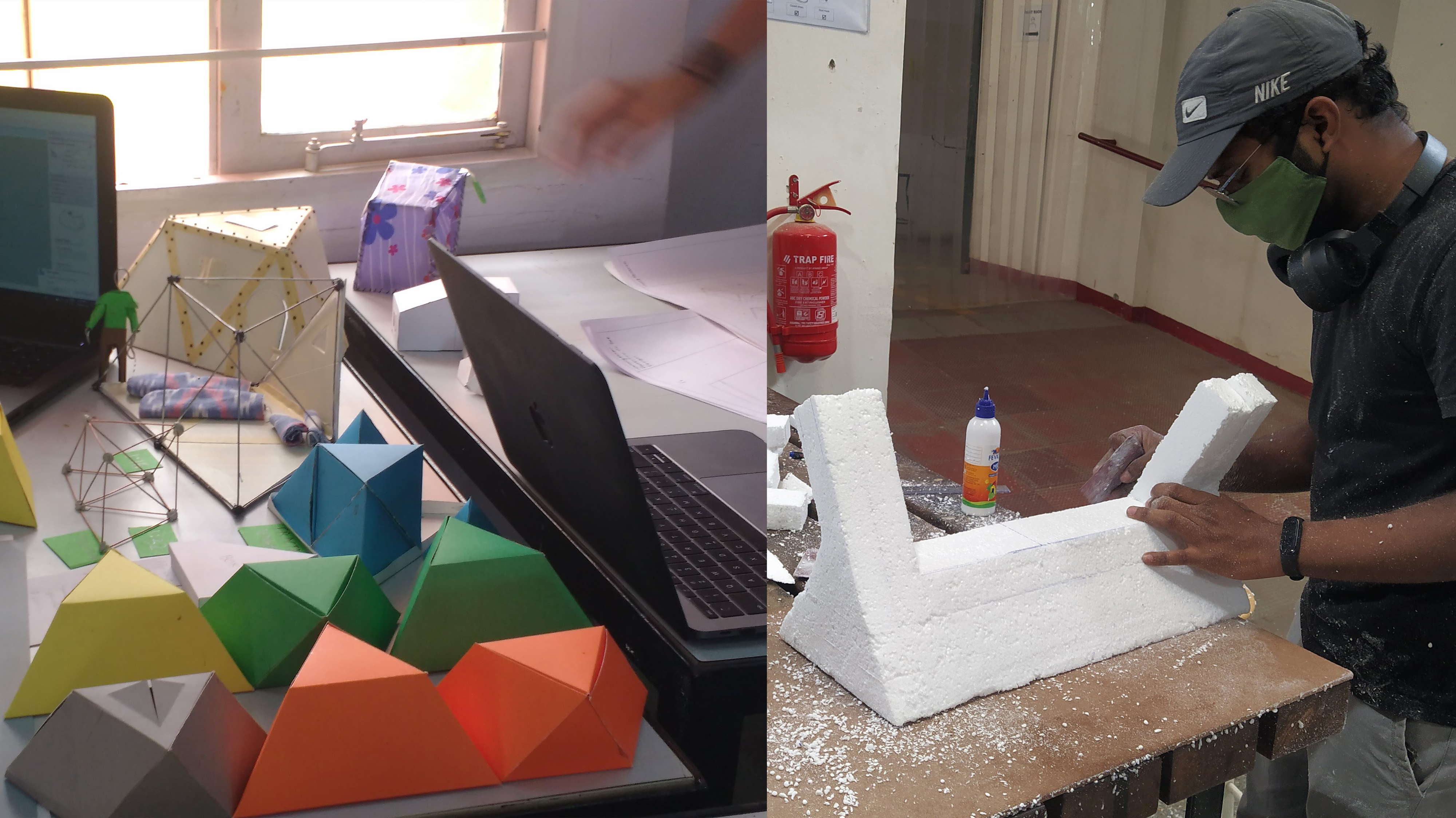 Studio- Form Generation and Prototyping
Studio- Form Generation and Prototyping
Program Highlights:
- Interdisciplinary Approach: We promote cross-disciplinary collaborations, enabling students to work alongside peers from various fields, enriching their perspectives and nurturing a holistic approach to design problem-solving.
- Real-world Engagement: Through partnerships with industries, NGOs, and governmental bodies, students gain real-world exposure and the opportunity to tackle complex, live projects. This bridges the gap between academia and industry.
- Global Outlook: We encourage students to explore design through a global lens. Exposure to international design trends, cultures, and practices equips them to become adaptable and culturally sensitive designers.
- Ethics and Social Responsibility: Discussions on ethics, diversity, and social responsibility are woven into the curriculum. Students are guided to create designs that are not only visually appealing but also culturally inclusive and socially impactful.
- Personalized Learning Paths: Recognizing that each student comes with a unique background, interest, and aspiration, we offer a range of electives and specialization options. This allows students to tailor their learning experience according to their passions.
Creative pathways:
- Product & Furniture Design,- Natural Fibres & Textiles
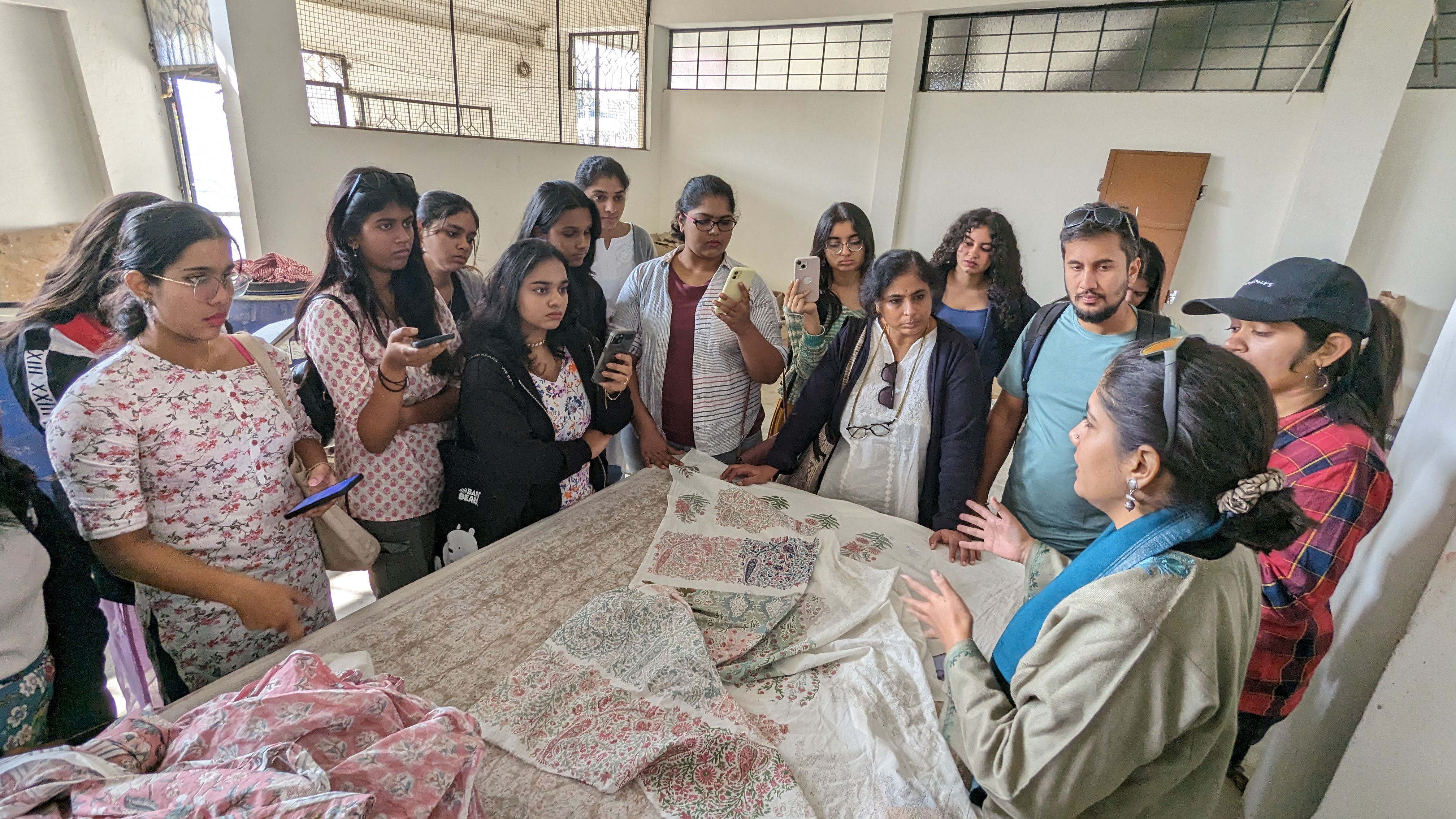 Collaborative Field based Design studio- students understanding trade of hand block prints
Collaborative Field based Design studio- students understanding trade of hand block prints
Capability Sets
- To abstract – navigating complexity and scale, to distil and express the essence
- To envision – an idea, a project, a future, a system, a practice, an industry
- To be industrious – to engage and persist, to analyze and synthesize, to translate and refine, to be proficient.
- To be curious – to explore and stretch, to challenge convention, to push boundaries
- To be empathic – to people, to the ecology, to practices, to material
- To be a conscious practitioner – to understand worldviews, develop alertness, to lead and manage with the ability to understand systems
- To be expressive – to be able to construct new theoretical and practical frameworks
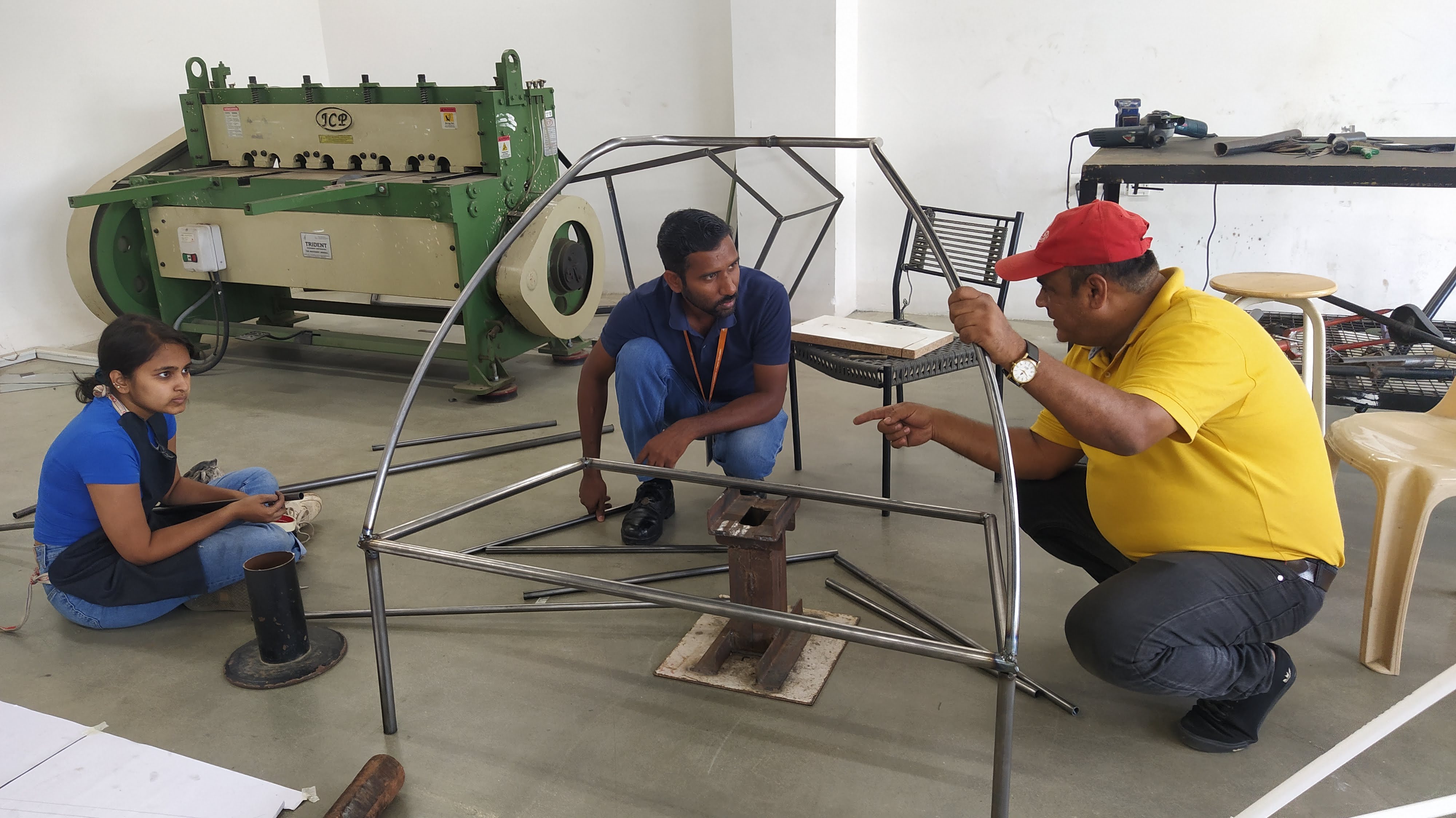 Student Working in workshop
Student Working in workshop
Learning Approaches
Program learning approaches include:
- Choosing outcomes that can lead to artistic expression, consciously choosing different methods of creative thinking
- Harnessing expertise and rich making skills available profusely at all levels in the Indian context through Locative Making
- Inter-disciplinary and participatory approach through engagement with people
- Expression of acquired learning using a theoretical framework to create a discourse, which sets the platform for new avenues. Understanding and positioning oneself in the larger eco-system
- Self motivated learning and Independent study, which comprises of research and scholarship, intellectual independence, management and supervision of one’s own work and study, being responsible for strategic decision making.
- Working with a line of inquiry that combines past experiences and future aspirations
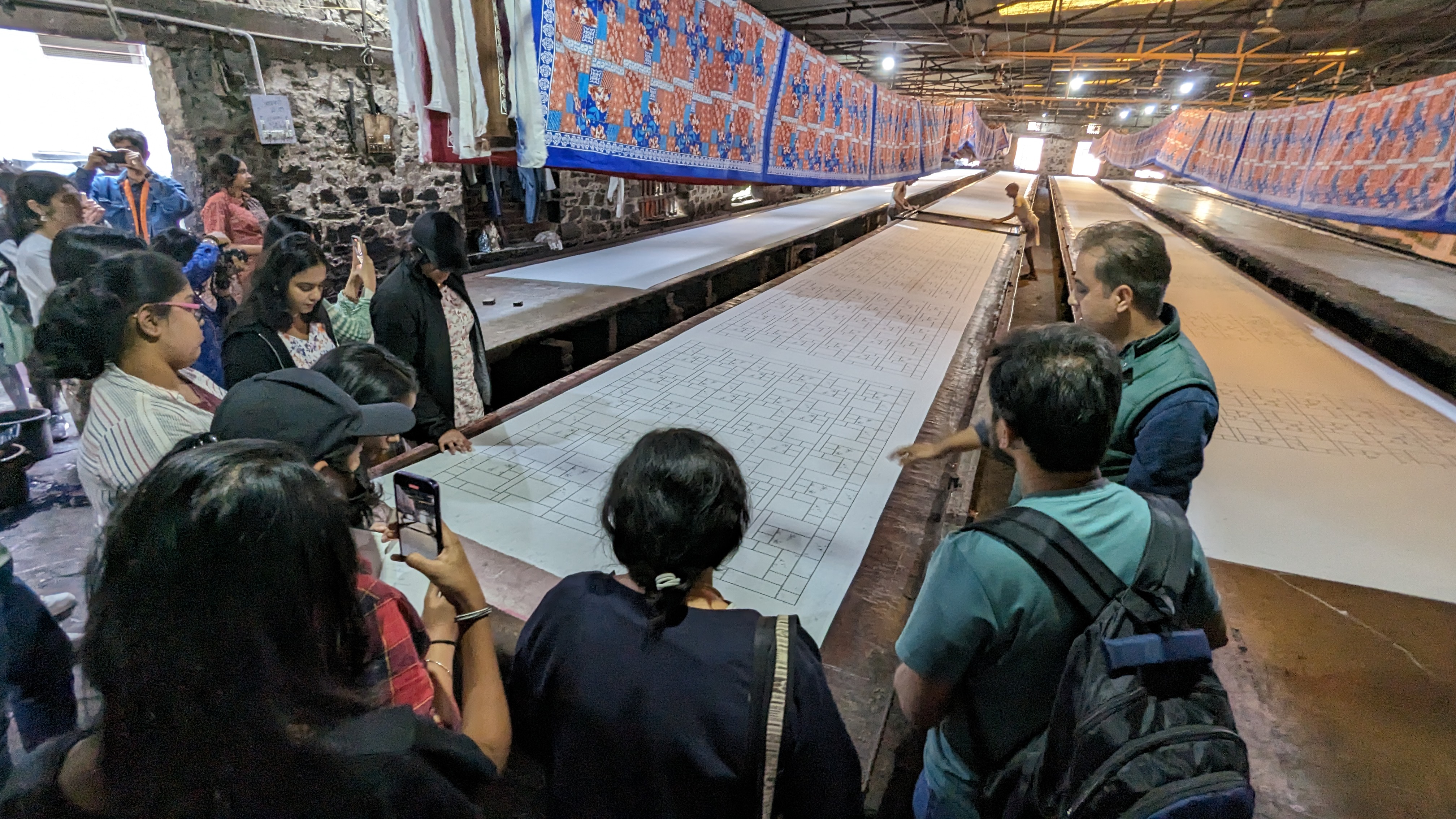 Industrial Visit
Industrial Visit
Graduate Impact: Upon completion of the program, our graduates emerge as design leaders who:
- Transform industries through innovative and sustainable solutions.
- Preserve and evolve the legacy of Indian craftsmanship.
- Drive positive social change through design interventions.
- Pioneer research that shapes the future of design thinking.
- Contribute to a more ecologically balanced and socially inclusive world.
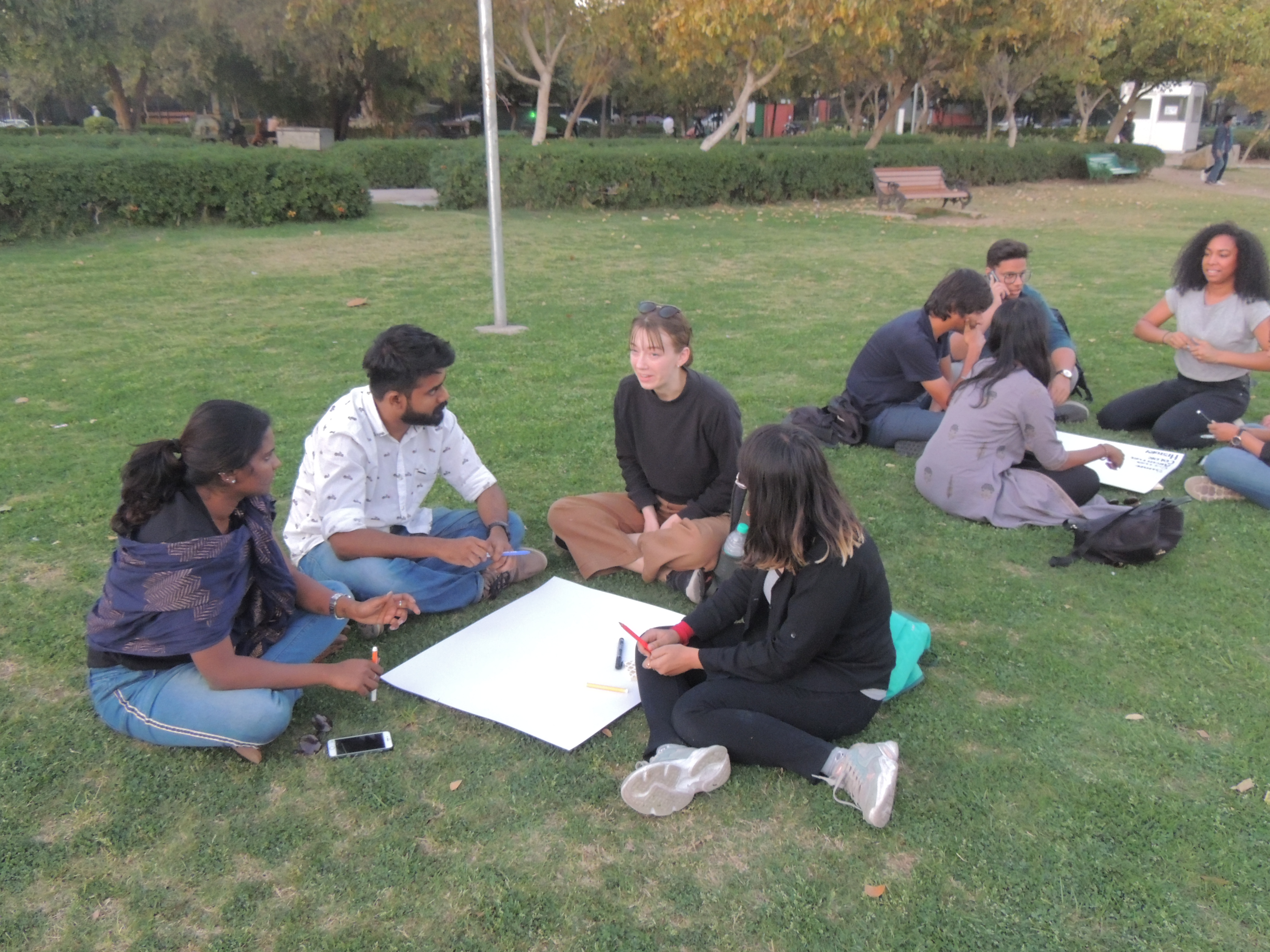 A Classroom outside classroom
A Classroom outside classroom
Opportunities
IADP Capability sets equip and prepare the student for a wide range of opportunities with:
- Creative Manufacturing Sectors – To be able to lead and drive creative practices in the non-governmental sector as well as mainstream Industry.
- Creative Studio Practice – Set up a studio practice to create and make exclusive high-quality artworks and art projects in chosen material and techniques.
- Design studios, R&D departments – Disseminating creative energies as a creative leader in small & large industries, and multi-national corporations, Merchandising and Strategic Product Planning in Retail, UI & UX in e-commerce for the transactions of the future.
- Family owned and managed Businesses – working for or creating a family venture, to bring in new practices and methods to rejuvenate older traditions.
- Start-ups, small and medium enterprises – Propositioning as a contemporary practitioner, entrepreneur or design consultant
People
Enquiries

FAQs
Industrial Art & Design practices are about the conceptual exploration, translation and expression of three dimensional artifacts and products using the best practices of both the Arts and Design. It encompasses the disciplines of Product, Textile & Furniture Design. It includes thinking and making skills, understanding production eco-systems, markets, trade practices and future ways of making. It develops autonomy and it develops creative confidence.
Most Industrial design courses focus on the needs of only mainstream Industry. The course encourages the exploration of making from large-scale processes to individual studio practice. The student explores different positions and worldviews to eventually find the one that works best for him/her. There is a large degree of autonomy in the course structure that allows the student to propose and execute work while being mentored by faculty drawn from a large pool of artists and designers. The course is designed to help you develop your own inquiry.
This course will allow you to explore creative practices at a more complex and autonomous level. This means that you will learn to devise your own pathway of learning, explore your interests as well as acquire an understanding about the larger eco-systems that designers and artists operate in.(For example policies, management, trade practices etc). After successful completion of the course you could be a part of an organization at a higher, decision making level or be able to set up your own studio practice in a context of contemporary creative thinking and making.
The M.Des course allows you to build on what you already know, whether it is engineering, architecture or art, it allows you to combine it with your own interests and construct new ways of learning and executing complex projects. The autonomy in the course along with the very diverse faculty who are available to mentor you means that you can learn and consolidate at a more complex level. The course will help you develop and follow your own line of inquiry.
The course is designed for different kinds of learners, and is focused on studio learning and trans-disciplinary, independent inquiry. There is an emphasis on exploration through making and doing.
There will be studio courses, workshops, locative making as well as projects (can be self-initiated, client based or classroom projects) and inputs could be in the form of talks, films, seminars and field visits.
Continuous evaluation through seminars, term papers, documentation& exhibition
As a creative practitioner, with an M.Des in Industrial Art & Design practice, there are a wide range of opportunities open to you. You could broadly work in any of the following areas:
- Become an entrepreneur, setting up a creative industry
- Work in an NGO, Export house or governmental agency at a senior capacity
- Set up a studio practice to produce fine art work
- Become a designer to either work free-lance or work in design or R&D firms
You will need to have a (minimum) 4 year UG degree from any stream to apply. You will find more details in our Admissions page. If you have a 3 year UG degree, you could apply for the Bridge Pathway of our PG Diploma Program, which is a 1 year program that prepares you to enter the M.Des program.
Srishti does not offer placement in the way that other Institutes do. We offer interfaces with industry through mentor labs, internships and the Post Graduate Conference at the end of the Course. These multiple opportunities help you to find the kind of work and organization that align with your interests.
IADP offers courses that develop inquiry and core design thinking. The emphasis is on process and not specific skills. Through the learning units you choose, you are free to explore various materials and media.




